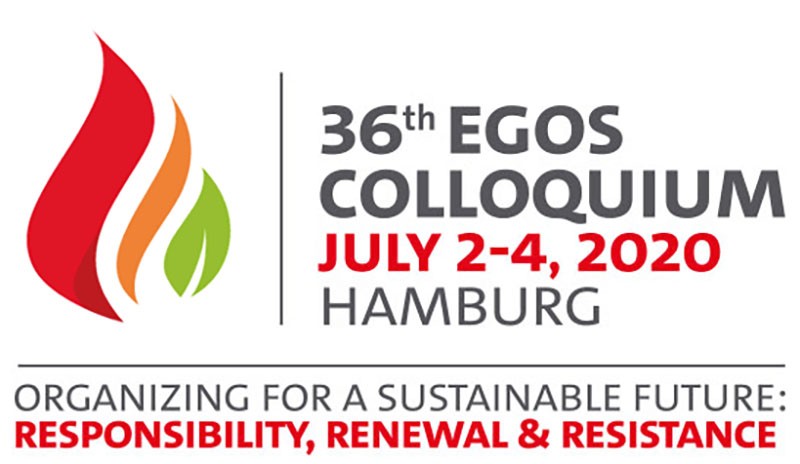The pre-Colloquium PhD Workshop 2020 will take place virtually on Tuesday, June 30, 2020, from 09:00 to 21:00 CEST (prior to the main virtual 36th EGOS Colloquium 2020).
Please note:
-
Deadline for applications for the PhD Workshop 2020 was January 14, 2020.
-
Only persons whose applications have been accepted after this date can attend this workshop.
-
To participate in this workshop, the accepted applicants have (1) to pay the EGOS membership fee and (2) to register for the subsequent main 36th EGOS Colloquium (July 2–4, 2020), i.e. they must pay a “symbolic” Colloquium fee.
Pre-Colloquium PhD Workshop 2020
Call for Applications
EGOS strongly encourages doctoral students to become active members of its vibrant and diverse community of organization
scholars. The EGOS pre-Colloquium PhD Workshop provides a platform for students working towards a doctorate in organization
studies to interact with, and learn from, fellow students and top scholars in various areas of research and scholarly inquiry.
It is designed as a springboard for successful academic careers by examining important issues such as publishing, reviewing,
and collaborative research; the event also provides a number of networking opportunities.
What to expect?
The pre-Colloquium PhD Workshop is offered to a limited number of students in advanced stages of the dissertation
journey (selection based on quality of application), and best suits the needs of those working with qualitative or mix-method
designs. It is taking place on Tuesday, June 30, 2020, prior to the main EGOS Colloquium.
The workshop covers the following topics, among others:
Publication process. Participants will examine the publication process together with experienced scholars and journal editors in order to learn from cases of success and failure in formulating, writing, submitting, and revising papers for top-journal publication.
Art of reviewing. Experienced scholars and journal editors will also offer insights into the art of reviewing as an essential component of the peer-reviewed publication process. Understanding and appreciating the review process will help in writing high-quality reviews as well as in successfully addressing reviewers’ comments and publishing one’s own work.
Dissertation journey. The workshop will enable participants to approach their doctoral dissertations with renewed vigour by engaging in discussions on research design and methodologies with renowned colleagues, and by reviewing their dissertation proposals with the help of others – fellow participants and more senior researchers who work in the respective area of scholarly inquiry.
International academic career. The mix of scholars from diverse academic backgrounds and institutions from around the globe is a key strength of EGOS, as well as of this workshop. Participants will gain exposure to similarities and differences across countries and continents in how academic processes work. This will also enhance their understanding with regard to different career opportunities and career paths.
The EGOS pre-Colloquium PhD Workshop is organized primarily around
participative interaction. Students are expected to prepare assigned readings carefully prior to the workshop in order to
be able to act as informed and active contributors. They will, however, not be asked to formally present their own work; rather,
students will extensively comment on their dissertation projects in small roundtable sessions, with a senior academic as a
facilitator and discussant.
Application guidelines
Please apply for admission to the workshop by Tuesday, January 14, 2020 at the latest. You should do so by uploading (via the EGOS website) a single PDF file that contains the following mandatory sections:
Name + contact details, including e-mail address, and phone number.
Doctoral program, including affiliation, main area(s) of studies, name(s) of your supervisor(s), and stage of your PhD work (e.g., “3rd year finalizing data collection; initial data analysis ongoing; all coursework completed”). – Please indicate if you have previously applied to the EGOS PhD Workshop (when) and have not been offered a place.
Motivation. A paragraph on how you will benefit from this workshop. Please clearly indicate your specific developmental needs (e.g., publishing, reviewing, collaborative research, career issues, getting your first job, methods, etc.).
Dissertation summary. Approx. three pages’ description of your doctoral dissertation project, including title, a precise research question, theoretical framing, empirical research design and preliminary findings, and references. Your description should also clearly convey how data have been collected/analyzed, and concisely indicate the academic field to which the thesis aims to contribute. [Your summary will serve as the basis for your assignment to a roundtable and the discussion in the feedback sessions at the workshop. You will get an opportunity to update your summary closer to the event.]
Please note!
The entire application document should follow the above mentioned sections and must not exceed four pages.
Applications that do not adhere to the guidelines will not be accepted; no late submissions will be allowed.
The number of participants is limited (applications in recent years by far outnumbered admissions). The quality of the proposal and the student’s potential benefit from the EGOS PhD Workshop are the primary criteria for admission.
You should not apply if you already participated in an EGOS PhD Workshop in one of the previous years. Please also make sure you actually are able to attend: a late cancellation effectively blocks an opportunity for one of your colleagues.
Successful applicants will be notified by the end of February 2020. For all administrative inquiries, please contact: secretariat@egosnet.eu
Participants are strongly encouraged to apply for other pre-Colloquium workshops offered on Wednesday, July 1, 2020,
as well as to consider the submission of a full paper to one of the sub-themes of the main EGOS Colloquium. All details are
available on the EGOS website.


